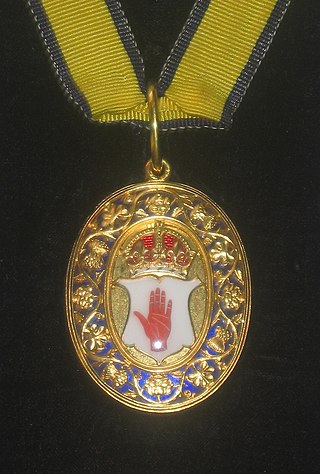
A baronet or the female equivalent, a baronetess, is the holder of a baronetcy, a hereditary title awarded by the British Crown. The title of baronet is mentioned as early as the 14th century; however, in its current usage it was created by James I of England in 1611 as a means of raising funds for the crown.
Nineteen baronetcies have been created for persons with the surname Hamilton, eight in the Baronetage of Nova Scotia, one in the Baronetage of England, five in the Baronetage of Ireland, one in the Baronetage of Great Britain and four in the Baronetage of the United Kingdom. As of 2024 two creations are extant, two are dormant, two are either extinct or dormant and twelve extinct.
The Speelman Baronetcy, of the Netherlands, is a title in the Baronetage of England. It was created on 9 September 1686 for the two-year-old Cornelis Speelman, who later became a General in the Dutch Army. At the same time his mother was given the rank of the widow of a baronet. Speelman was the only son of Johan Cornelis Speelman (1659–1686) and a grandson of Governor-General of the Dutch East Indies Cornelis Speelman (1628–1684). Johan died before the letters patent intended to create him a baronet had passed the Great Seal. The sixth Baronet was Burgemeester of the city of Harlingen in the Netherlands.
There have been three baronetcies created for persons with the surname Fleming, one in the Baronetage of Nova Scotia, one in the Baronetage of England and one in the Baronetage of Great Britain. As of 2008 one creation is extant, one extinct and one either extinct or dormant.
There have been six Cunningham baronetcies:

There have been four baronetcies created for persons with the surname Hope, three in the Baronetage of Nova Scotia and one in the Baronetage of the United Kingdom. As of 2010 one creation is extant, one dormant and two extinct.
There have been four baronetcies created for persons with the surname Temple, two in the Baronetage of England, one in the Baronetage of Nova Scotia and one in the Baronetage of the United Kingdom.
There have been two baronetcies created for persons with the surname Piers, one in the Baronetage of Nova Scotia, now extinct, and one in the Baronetage of Ireland, extant as of 2018.
There have been seven baronetcies created for persons with the surname Sinclair, six in the Baronetage of Nova Scotia and one in the Baronetage of Great Britain. Four of the creations are extant as of 2008.
The Dunbar, later Hope-Dunbar Baronetcy, of Baldoon, is a title in the Baronetage of Nova Scotia. It was created on 13 October 1664 for David Dunbar, with remainder to his heirs male and tailzie. The baronetcy became dormant on his death in 1686. The title remained dormant until 1916, when it was successfully claimed by Charles Hope-Dunbar, who became the sixth Baronet. He was a descendant of Mary, granddaughter and sole heiress of the first Baronet. Hope-Dunbar was also the grandson of the Hon. Charles Hope, third son of John Hope, 4th Earl of Hopetoun. Consequently, the present holder of the baronetcy is also in remainder to the earldom of Hopetoun and its subsidiary titles the viscountcy of Aithrie, lordship of Hope and baronetcy of Kirkliston, titles held by his kinsman the Marquess of Linlithgow.
There have been three baronetcies created for members of the Ogilvy family, all in the Baronetage of Nova Scotia. As of 2008 one creation is extant while two are either extinct or dormant.
There have been four baronetcies created for persons with the surname Hay, all in the Baronetage of Nova Scotia. Two creations are extinct, one dormant and one extant. A fifth baronetcy in the Jacobite Peerage, although theoretically extant, is not recognised by the Lyon Office.
There have been four baronetcies created for persons with the surname Seton, all in the Baronetage of Nova Scotia. As of 2008 one creation is extant, one dormant and two extinct.
There have been five baronetcies created for persons with the surname Home, four in the Baronetage of Nova Scotia and one in the Baronetage of the United Kingdom. Only one creation is extant as of 2008.

There have been five baronetcies created for persons with the surname Kennedy, one in the Baronetage of Ireland, three in the Baronetage of Nova Scotia and one in the Baronetage of the United Kingdom. One creation is extant as of 2010.
There have been three baronetcies created for persons with the surname Hume, two in the Baronetage of Nova Scotia and one in the Baronetage of Great Britain. One creations is dormant while two are extinct.

There have been three baronetcies created for persons with the surname Meredith, one in the Baronetage of England, one in the Baronetage of Nova Scotia and one in the Baronetage of the United Kingdom. Two of the creations are extinct while one is dormant.

Canadian peers and baronets exist in both the peerage of France recognized by the Monarch of Canada and the peerage of the United Kingdom.
Following the final collapse of the Mughal Dynasty in 1857 and the proclamation of the British Indian Empire, the British continued to maintain and recognise many of the old Mughal and Hindu styles and titles, introducing a compound honours system which awarded those titles along with British noble and aristocratic titles and knighthoods. Uniquely, the Indian subcontinent was the only part of the British dominion where British hereditary titles were conferred upon British subjects not of European ancestry. All British titles and honours became obsolete after the formation of the modern Republic of India in 1950, though they continue to be recognised by the British government. The Portuguese gave titles and created coats of arms for its Goan citizens from the early 1700s, both Hindu and Indian Christian. These titles however lost their recognition after the Portuguese Revolution and start of the First Portuguese Republic in 1910.